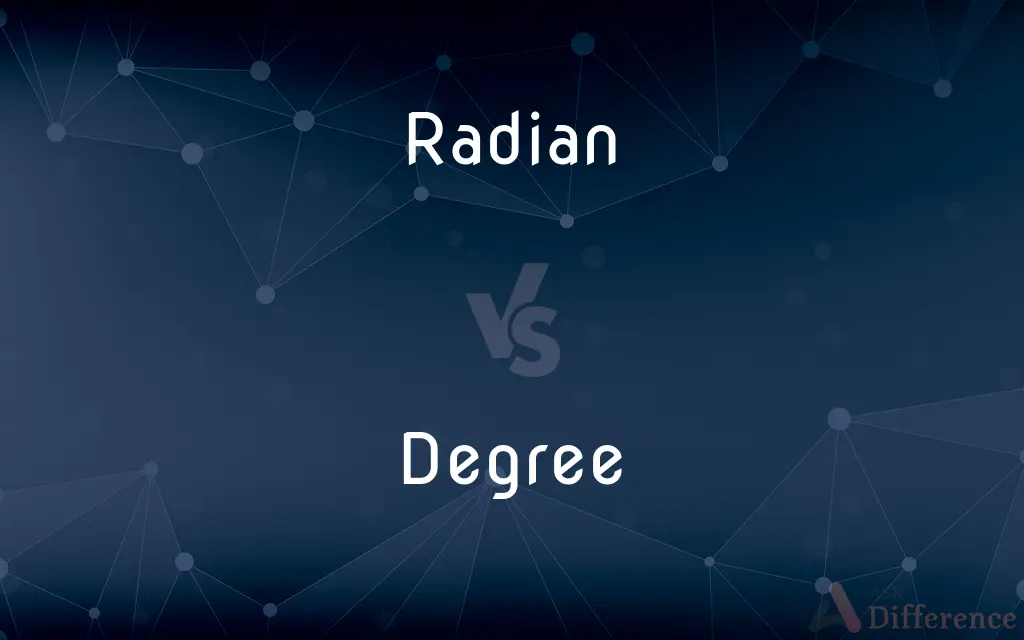Radian vs. Degree — What's the Difference?
By Fiza Rafique & Maham Liaqat — Updated on April 17, 2024
Radian and degree are units of angle measurement; radians are the standard unit in mathematics, expressed in terms of pi, while degrees are based on dividing a circle into 360 equal parts.

Difference Between Radian and Degree
Table of Contents
ADVERTISEMENT
Key Differences
Radians are a unit derived from the radius of a circle, where one radian is the angle produced when the arc length equals the radius. Degrees, on the other hand, define angles based on a division of a circle into 360 parts, making each degree one 360th of a circle's total angle.
In radians, a complete circle is 2π radians, emphasizing the relationship between the circle's circumference and its radius. Whereas in degrees, a full circle is 360 degrees, a convention that originates from ancient astronomy and navigation.
Radians are primarily used in fields requiring precise calculations like mathematics and engineering due to their natural integration with the circle's geometry. In contrast, degrees are more commonly used in everyday situations, education, and fields like geography and meteorology.
One radian is approximately 57.2958 degrees, providing a direct numeric conversion essential for various calculations. Conversely, one degree equals about 0.01745 radians, which is useful for converting traditional measurements into mathematical formulas.
When using radians, trigonometric functions like sine and cosine have simpler and more intuitive expressions, which benefit analytical and computational practices. On the other hand, degrees offer more straightforward understanding and usage for general education and practical applications like navigation.
ADVERTISEMENT
Comparison Chart
Definition
The angle with an arc length equal to the radius of the circle.
One 360th of the full angle of a circle.
Circle Coverage
2π radians per circle.
360 degrees per circle.
Common Usage
Mathematics, physics, engineering.
General education, navigation, meteorology.
Conversion Factor
1 rad = 57.2958 degrees.
1 degree = 0.01745 radians.
Relation to Circle
Directly relates to the circle's geometry.
Based on arbitrary division of the circle.
Compare with Definitions
Radian
Integral to the unit circle concept.
The unit circle allows for defining trigonometric functions with radians.
Degree
Convenient for daily use and less technical fields.
The thermostat was set to increase by 2 degrees.
Radian
Defined such that the arc length equals the radius of the circle.
A 1 radian angle subtends an arc equal in length to the radius of the circle.
Degree
Common in education for introducing geometry concepts.
A right angle is 90 degrees.
Radian
Used in the study of periodic functions.
The sine wave completes one cycle every 2π radians.
Degree
Used for simple navigational and geographical measurements.
Longitude and latitude are measured in degrees.
Radian
Essential for calculus and trigonometry.
The derivative of the sine function is cos(x), where x is in radians.
Degree
Utilized in various fields such as astronomy and meteorology.
Astronomers measure the angular separation of stars in degrees.
Radian
Unit of angular measure used in many areas of mathematics.
The angle of a sector with an arc length twice the radius is 2 radians.
Degree
The amount, level, or extent to which something happens or is present
A question of degree
A degree of caution is probably wise
Radian
The radian, denoted by the symbol rad {\displaystyle {\text{rad}}} , is the SI unit for measuring angles, and is the standard unit of angular measure used in many areas of mathematics. The unit was formerly an SI supplementary unit (before that category was abolished in 1995) and the radian is now an SI derived unit.
Degree
A unit of measurement of angles, one ninetieth of a right angle or the angle subtended by one three-hundred-and-sixtieth of the circumference of a circle
Set at an angle of 45 degrees
Radian
A unit of angular measure equal to the angle subtended at the center of a circle by an arc equal in length to the radius of the circle, approximately 57°17′44.6".
Degree
A unit in any of various scales of temperature, intensity, or hardness
Water boils at 100 degrees Celsius
Radian
(geometry) In the International System of Units, the derived unit of plane angular measure of angle equal to the angle subtended at the centre of a circle by an arc of its circumference equal in length to the radius of the circle. Symbol: rad
Degree
An academic rank conferred by a college or university after examination or after completion of a course, or conferred as an honour on a distinguished person
A degree in zoology
Radian
An arc of a circle which is equal to the radius, or the angle measured by such an arc.
Degree
Social or official rank
Persons of unequal degree
Radian
The unit of plane angle adopted under the Systeme International d'Unites; equal to the angle at the center of a circle subtended by an arc equal in length to the radius (approximately 57.295 degrees)
Degree
One of a series of steps in a process, course, or progression; a stage
Proceeded to the next degree of difficulty.
Degree
A step in a direct hereditary line of descent or ascent
First cousins are two degrees from their common ancestor.
Degree
Relative social or official rank, dignity, or position.
Degree
Relative intensity or amount, as of a quality or attribute
A high degree of accuracy.
Degree
The extent or measure of a state of being, an action, or a relation
Modernized their facilities to a large degree.
Degree
A unit division of a temperature scale.
Degree
(Mathematics) A planar unit of angular measure equal in magnitude to 1/360 of a complete revolution.
Degree
A unit of latitude or longitude, equal to 1/360 of a great circle.
Degree
The greatest sum of the exponents of the variables in a term of a polynomial or polynomial equation.
Degree
The exponent of the derivative of highest order in a differential equation in standard form.
Degree
An academic title given by a college or university to a student who has completed a course of study
Received the Bachelor of Arts degree at commencement.
Degree
A similar title conferred as an honorary distinction.
Degree
(Law) A division or classification of a specific crime according to its seriousness
Murder in the second degree.
Degree
A classification of the severity of an injury, especially a burn
A third-degree burn.
Degree
(Grammar) One of the forms used in the comparison of adjectives and adverbs. For example, tall is the positive degree, taller the comparative degree, and tallest the superlative degree of the adjective tall.
Degree
One of the seven notes of a diatonic scale.
Degree
A space or line of the staff.
Degree
A stage of proficiency or qualification in a course of study, now especially an award bestowed by a university or, in some countries, a college, as a certification of academic achievement. (In the United States, can include secondary schools.)
She has two bachelor's degrees and is studying towards a master's degree.
Degree
(geometry) A unit of measurement of angle equal to 360 of a circle's circumference.
A right angle is a ninety-degree angle.
Most humans have a field of vision of almost 180 degrees.
Degree
(physics) A unit of measurement of temperature on any of several scales, such as Celsius or Fahrenheit.
180 degrees Fahrenheit is equivalent to 100 degrees Celsius.
Water boils at 100 degrees Celsius.
Degree
(algebra) The sum of the exponents of a term; the order of a polynomial.
A quadratic polynomial is a polynomial of degree 2.
Degree
The dimensionality of a field extension.
The set of complex numbers constitutes a field extension of degree 2 over the real numbers.
The Galois field has degree 3 over its subfield
Degree
(graph theory) The number of edges that a vertex takes part in; a valency.
Degree
(logic) The number of logical connectives in a formula.
Degree
(surveying) The curvature of a circular arc, expressed as the angle subtended by a fixed length of arc or chord.
Degree
(geography) A unit of measurement of latitude and longitude which together identify a location on the Earth's surface.
Degree
(grammar) Any of the three stages (positive, comparative, superlative) in the comparison of an adjective or an adverb.
Degree
A step on a set of stairs; the rung of a ladder.
Degree
An individual step, or stage, in any process or scale of values.
Degree
A stage of rank or privilege; social standing.
Degree
(genealogy) A ‘step’ in genealogical descent.
Degree
One's relative state or experience; way, manner.
Degree
The amount that an entity possesses a certain property; relative intensity, extent.
To what degree do the two accounts of the accident concur?
Degree
A step, stair, or staircase.
By ladders, or else by degree.
Degree
One of a series of progressive steps upward or downward, in quality, rank, acquirement, and the like; a stage in progression; grade; gradation; as, degrees of vice and virtue; to advance by slow degrees; degree of comparison.
Degree
The point or step of progression to which a person has arrived; rank or station in life; position.
Degree
Measure of advancement; quality; extent; as, tastes differ in kind as well as in degree.
The degree of excellence which proclaims genius, is different in different times and different places.
Degree
Grade or rank to which scholars are admitted by a college or university, in recognition of their attainments; also, (informal) the diploma provided by an educational institution attesting to the achievement of that rank; as, the degree of bachelor of arts, master, doctor, etc.; to hang one's degrees on the office wall.
The youth attained his bachelor's degree, and left the university.
Degree
A certain distance or remove in the line of descent, determining the proximity of blood; one remove in the chain of relationship; as, a relation in the third or fourth degree.
In the 11th century an opinion began to gain ground in Italy, that third cousins might marry, being in the seventh degree according to the civil law.
Degree
Three figures taken together in numeration; thus, 140 is one degree, 222,140 two degrees.
Degree
State as indicated by sum of exponents; more particularly, the degree of a term is indicated by the sum of the exponents of its literal factors; thus, a2b3c is a term of the sixth degree. The degree of a power, or radical, is denoted by its index, that of an equation by the greatest sum of the exponents of the unknown quantities in any term; thus, ax4 + bx2 = c, and mx2y2 + nyx = p, are both equations of the fourth degree.
Degree
A 360th part of the circumference of a circle, which part is taken as the principal unit of measure for arcs and angles. The degree is divided into 60 minutes and the minute into 60 seconds.
Degree
A division, space, or interval, marked on a mathematical or other instrument, as on a thermometer.
It has been said that Scotsmen . . . are . . . grave to a degree on occasions when races more favored by nature are gladsome to excess.
Degree
A position on a scale of intensity or amount or quality;
A moderate degree of intelligence
A high level of care is required
It is all a matter of degree
Degree
A specific identifiable position in a continuum or series or especially in a process;
A remarkable degree of frankness
At what stage are the social sciences?
Degree
An award conferred by a college or university signifying that the recipient has satisfactorily completed a course of study;
He earned his degree at Princeton summa cum laude
Degree
A unit of temperature on a specified scale;
The game was played in spite of the 40-degree temperature
Degree
A measure for arcs and angles;
There are 360 degrees in a circle
Degree
The highest power of a term or variable
Degree
The seriousness of something (e.g., a burn or crime);
Murder in the second degree
A second degree burn
Common Curiosities
Why are radians more effective in mathematics?
Radians directly relate to the properties of a circle, making them more natural for calculations involving periodic functions and calculus.
How many degrees are there in a radian?
There are approximately 57.2958 degrees in one radian.
Are radians and degrees interchangeable in formulas?
They are interchangeable with the appropriate conversion, but care must be taken as their values differ significantly.
What is a radian?
A radian is a unit of angular measurement where the angle is formed by wrapping the radius of the circle along its circumference.
What is the advantage of using degrees?
Degrees are easier to understand and more familiar for daily, educational, and less technical uses.
What role do degrees play in navigation?
Degrees are essential for navigation, allowing for precise directional measurements and map reading.
Is there a visual difference between a radian and a degree?
Visually, a radian represents a larger angle on a circle compared to a degree due to the different bases of their measurements.
How do radians simplify trigonometric calculations?
Radians allow for the simplification of derivatives and integrals in trigonometry, enhancing mathematical elegance and utility.
How is the radian defined in terms of pi?
A radian is defined as the angle at which the arc length is equal to the radius, typically expressed as a multiple of π.
What is the historical origin of the degree?
The degree originated from the ancient civilizations' methods of dividing the day into smaller parts, later applied to the circle.
Why is it important to choose the right unit for measuring angles?
The choice affects calculation simplicity, precision, and contextual appropriateness in fields like engineering or meteorology.
What is a practical example of using degrees in everyday life?
Weather forecasts often use degrees to describe wind direction.
Share Your Discovery

Previous Comparison
Daoism vs. Taoism
Next Comparison
Sore vs. HurtAuthor Spotlight
Written by
Fiza RafiqueFiza Rafique is a skilled content writer at AskDifference.com, where she meticulously refines and enhances written pieces. Drawing from her vast editorial expertise, Fiza ensures clarity, accuracy, and precision in every article. Passionate about language, she continually seeks to elevate the quality of content for readers worldwide.
Co-written by
Maham Liaqat













































